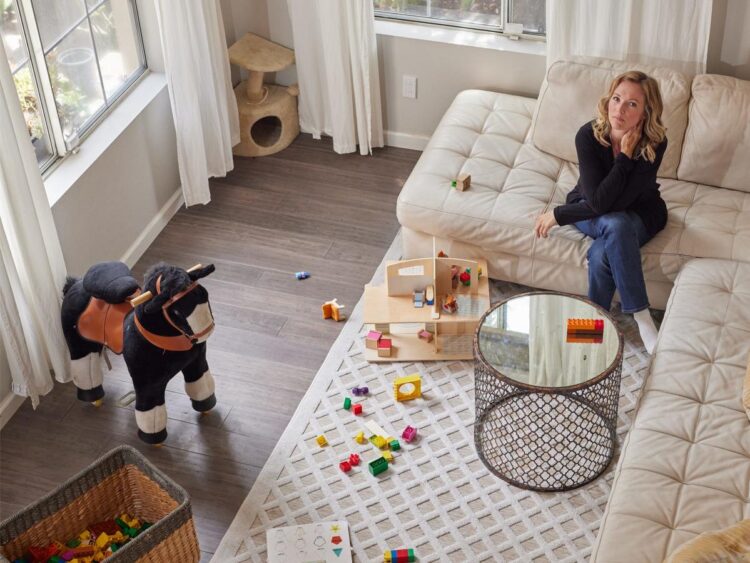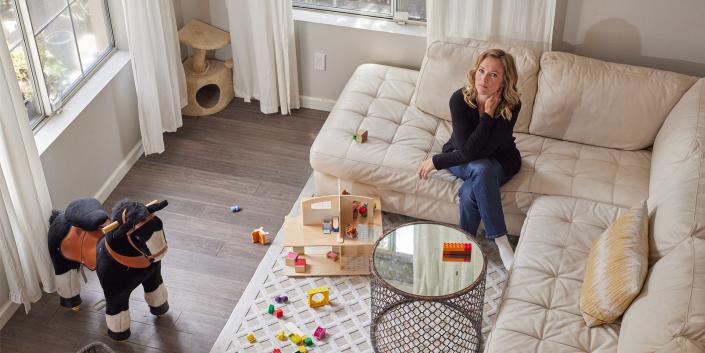
How the ‘junk science’ of parental alienation infiltrated American family courts and allowed accused child abusers to win custody of their kids.
This story was reported in partnership with the nonprofit newsroom Type Investigations.
In the summer of 2020, when he was 12, the boy told his therapist something he’d never told anyone else.
For years, Robert claimed, his stepdad had sexually abused him.
The therapist alerted the San Diego County child welfare agency, which launched an investigation. The county sheriff opened an inquiry, too. Thomas Winenger, the only father figure Robert had ever known, began assaulting him when he was only 7, Robert told a forensic social worker in October 2020. Winenger would pin him down, cover his mouth, and force him into acts he found “disgusting,” he said. Sometimes, he said, Winenger recited Bible verses during the attacks, claiming the devil was in Robert’s heart.
Robert, whom Insider is identifying by only his middle name, said that as he struggled to breathe, he fought back by hitting, punching, and kneeing his stepfather. But he said Winenger overpowered him.
By the time Robert came forward, Winenger had been named his legal father and was divorced from Robert’s mother, Jill Montes, with whom he also shared two young daughters. Robert confronted Winenger with the allegations that November, and within weeks Winenger denied the claims in family court. “This NEVER HAPPENED,” he asserted in a filing.
He offered an alternative explanation for Robert’s disturbing claims, one that shifted the blame to Robert’s mother.
Montes, Winenger contended, had engaged in a pattern of manipulation known as “parental alienation.” Robert’s accusations weren’t evidence that he’d abused the boy, Winenger claimed. They were evidence that Montes had poisoned the children against him. The delayed timing of Robert’s allegations, Winenger argued, only made them more suspicious. Montes was causing the children such grave psychological harm, he claimed in the filing, that the children should be transferred to his custody right away.
That December, Child Welfare Services substantiated Robert’s allegations, calling them “credible, clear, and concise.” But the family-court judge, Commissioner Patti Ratekin, withheld judgment until the following October, when the psychologist she’d appointed as a custody evaluator submitted his own report.
That report, which has been sealed by the court, appears to have convinced Ratekin that Winenger was correct.
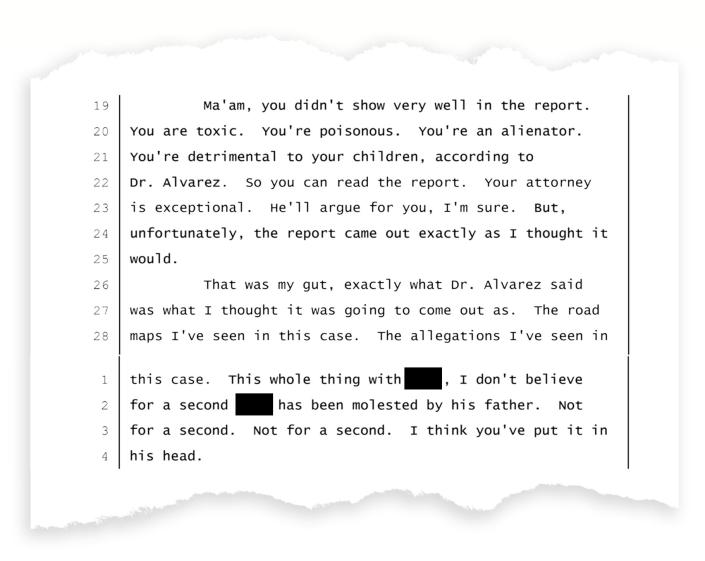
“Ma’am, you didn’t show very well in the report. You are toxic. You’re poisonous. You’re an alienator,” Ratekin told Montes at a hearing on October 28, 2021. “I don’t believe for a second” that Robert’s father molested him. “Not for a second,” she repeated. “I think you’ve put it in his head.”
Ratekin acted swiftly, granting Winenger’s bid for custody and ordering him to enroll Robert and his sisters in Family Bridges, a program that claims to help “alienated” children reconnect with a parent they’ve rejected. She barred Montes, a stay-at-home mom and home schooler, from all contact with her children for at least 90 days, a standard prerequisite for admission to the program.
“I just wanted to crumble,” Montes said.
Rejected as a psychiatric disorder
Parental alienation is a fairly recent idea, conceived in the 1980s by a psychiatrist, Dr. Richard Gardner, who argued that divorcing mothers, desperate to win custody suits, were brainwashing children against their fathers. In “severe” cases, Gardner wrote, children with “parental alienation syndrome” must be removed from their mothers, transferred to the care of their fathers, and reeducated through what he called “threat therapy.”
Alienation has never been accepted as a psychiatric disorder by the medical establishment. Yet today, mental-health practitioners across the United States assess and treat it, particularly those who specialize in custody cases. Many of them collaborate closely, attending the same conferences, following the same protocols, and citing the same papers. Some run reunification programs like Family Bridges; others offer family therapy or produce custody evaluations for family courts.
Influenced by these experts, many judges have given the unproven concept the force of law.
Though most custody cases settle out of court, in a small fraction parents don’t come to terms. In some of these contested cases, one parent accuses the other of alienating the children. The most intense disputes arise in cases where one parent alleges spousal or child abuse and the other responds with a claim of alienation.
But alienation claims are highly gendered. Men level the accusation against women nearly six times as often as women level it against men, one study suggests. That landmark study, published in 2020, found that in cases when mothers alleged abuse and fathers responded by claiming alienation, the mothers stood a startlingly high chance of losing custody.
Occasionally, parents accused of alienation are cut off from their children altogether. Since 2000, judges have sent at least 600 children to reunification programs that recommend the temporary exile of the trusted parent, a collaborative investigation by Insider and Type Investigations revealed. While the programs suggest a “no-contact period” of 90 days, this term is routinely extended and may last years, according to an analysis of tens of thousands of pages of court papers and program records.
The treatment typically starts with a four-day workshop for children and the parent they’ve rejected; aftercare can add months or years. Children may be seized for the workshop by force, with no opportunity for goodbyes.
Former participants at Family Bridges and a similar program, Turning Points for Families, said they were taught that their memories were unreliable, the parent they preferred was harmful, and the parent they’d rejected was loving and safe. In some cases, participants who resisted these lessons said they were verbally threatened; at Family Bridges, a few were threatened with institutionalization. Some participants said they ended up depressed and suicidal.
Program officials say they are helping children. Lynn Steinberg, a therapist who runs a program called One Family at a Time, said in an interview that virtually all the kids she’s enrolled have falsely accused a parent of abuse and that she does not accept children into her program whose abuse claims have been substantiated. Without treatment, she said, alienated children would risk being plagued by guilt, and the relationship they wrongly spurned might never heal.
In Steinberg’s view, the only child abusers in the families she sees are the “alienators,” who have “annihilated” a devoted parent from their children’s lives.
Recently, alienation theory has faced rising criticism. Efforts to legitimize the diagnosis have been rebuffed by the American Psychiatric Association, the World Health Organization, and the American Professional Society on the Abuse of Children. And the reunification programs burst into public view last fall, when a video documented two terrified children in Santa Cruz, California, being seized for One Family at a Time. In the clip, which went viral on TikTok, a 15-year-old girl named Maya pleads and shrieks as she’s picked up by the arms and legs and forced into a black SUV.
Since then, bills that would restrict reunification programs have been introduced in Sacramento and four other state capitols.
An idea takes off
When a law professor named Joan Meier founded a nonprofit to help victims of domestic violence two decades ago, she didn’t expect to focus on custody disputes. But day after day, she heard from mothers with similar, troubling stories. They’d finally escaped their abusive marriages, but their exes had fought them for custody — and won. The mothers had been accused of something Meier knew little about: parental alienation.
Meier, who taught at George Washington University, ordered a stack of books by the child psychiatrist who coined the term.
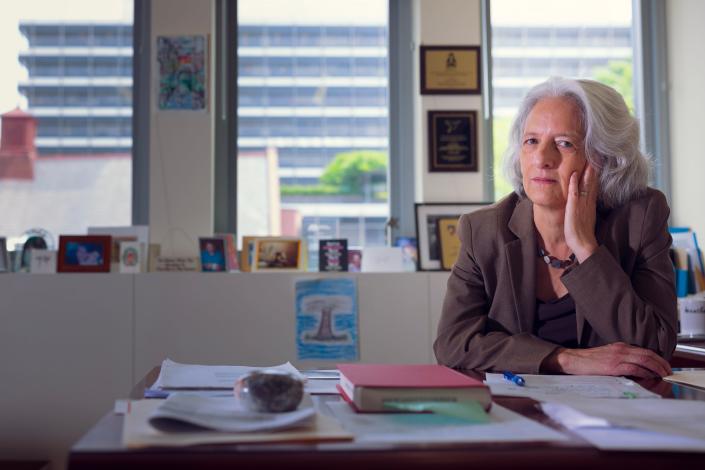
Richard Gardner began writing about children of divorce in the 1970s, when a dramatic transformation was underway in family court. Under the “tender years presumption,” judges had long favored women in divorce cases, typically assigning children to their mother’s sole custody. But as more women entered the workforce, more men participated in child-rearing, and more couples divorced, a nascent “fathers’ rights” movement emerged, demanding gender neutrality in custody proceedings. The idea appealed to many feminists, too. By the 1980s, most states had recognized joint custody in their statutes.
This left judges in a quandary when couples failed to settle. Now, aside from a vague mandate to advance the “best interest” of children, courts lacked a clear paradigm for resolving disputes. Overwhelmed, judges turned to mental-health professionals, asking them to assess each parent’s fitness and recommend an optimal arrangement. Gardner, then an associate clinical professor of child psychiatry at Columbia University, was an early custody evaluator, and in 1982 he published a how-to manual.
By 1985, Gardner was arguing that some mothers, seeking to regain their advantage in court, were inducing a mental illness in their children, a condition he dubbed parental alienation syndrome. Children afflicted with the syndrome, he said, could be identified by the “campaign of denigration” they waged against their fathers, which was accompanied by “weak, frivolous, or absurd” rationalizations and a disquieting “lack of ambivalence.”
Some “fanatic” mothers even manipulated children into claiming their fathers had sexually abused them, Gardner contended. When other maneuvers against a father fail, he wrote, “the sex-abuse accusation emerges as a final attempt to remove him entirely from the children’s lives.” Child sexual-abuse claims made during custody disputes, he claimed, “have a high likelihood of being false.” To prove children are suggestible, he often invoked the wave of 1980s cases in which preschool teachers were charged with sexual abuse but later exonerated.
Gardner’s theory sidestepped what Joan Meier saw as a glaring truth: Many children accused their fathers of abuse because their fathers were actually abusive. In fact, by the early 2000s a large-scale study had found that contrary to Gardner’s writings, neither children nor mothers were likely to fabricate claims during custody disputes.
The remedies Gardner proposed for parental alienation syndrome were harsh. “Insight, tenderness, sympathy, empathy have no place in the treatment of PAS,” he said in a 1998 address. “Here you need a therapist who is hard-nosed, who is comfortable with authoritarian, dictatorial procedures.”
In a 2001 documentary, Gardner told a journalist how a mother might respond to a child reporting sexual abuse: “I don’t believe you. I’m going to beat you for saying it. Don’t you ever talk that way again about your father.”
Juvenile detention could cure children who refused to visit their fathers, Gardner said. But the main remedy he advanced in severe cases was “the removal of the children from the mother’s home and placement in the home of the father, the allegedly-hated parent.” This would break what he called a “sick psychological bond.”
After introducing his theory, Gardner began using it in expert testimony and promoting it to other evaluators and fathers’-rights activists. By the early 2000s, family-court judges were regularly citing parental alienation.
To address this, Meier said, she undertook a series of academic articles examining the scholarship on parental alienation. She found that the theory was based on circular reasoning and anchored almost entirely in anecdotal data.
“I still believed in that day that if you did careful, thoughtful analytic scholarship, people would read it and be persuaded by it,” she said.
The scarlet ‘A’
Jill Montes had always wanted a big family. In 2008, she already had a 5-year-old daughter, Paige, with a man she’d divorced, and she was finding regular work as an actor in Los Angeles. She decided to adopt an infant son, Robert.
The next year, she met Thomas Winenger, who had master’s degrees in engineering and business, on eHarmony. “He wanted to talk a lot about faith and God, and that wooed me,” she said. She also welcomed his interest in Robert, whom she was insecure about raising alone.
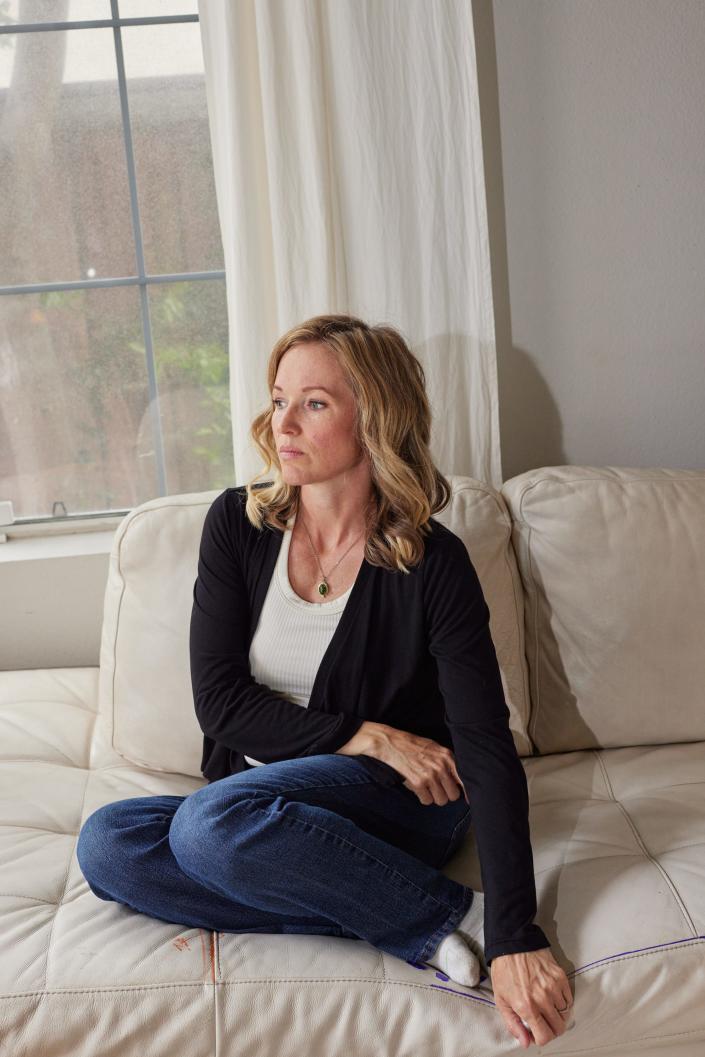
In 2011, the couple married and settled near San Diego, and Montes quit acting. Soon, she later said in a court filing, Winenger was shoving, insulting, and threatening her, often in front of the kids. He promised to change, and she hoped he could. In 2012, their first child, Claire, was born, and Eden followed in 2015. Insider is identifying Montes’ children by only their middle names.
Later that year, Montes accused Winenger of dragging Paige across a room. Montes sought a restraining order, which was ultimately denied, and kicked him out. He rented a room in a house nearby, where he regularly hosted the three younger kids. Sometimes, Robert went there by himself.
Montes filed for divorce in February 2018. Under an informal agreement, the kids continued spending time at Winenger’s place. But at a hearing that fall, a 10-year-old Robert testified that during an argument over his math homework, Winenger had repeatedly grabbed, shoved, and spanked him.
Montes filed a petition for a domestic-violence restraining order, which Winenger fought, saying he hadn’t mistreated Robert. In the end, Ratekin, the judge presiding over the divorce, signed a “stay away” order prohibiting Winenger from contact with Robert. But it didn’t address the allegation of violence. Weeks later, Winenger asked Ratekin to name him Robert’s legal father, arguing that he’d helped raise the boy from toddlerhood. Ratekin ruled in his favor and ordered the custody evaluation.
In court papers he filed on July 19, 2019, the day after the evaluator was appointed, Winenger accused Montes of parental alienation.
Often, according to Meier, the dynamic of a custody case shifts radically once alienation is raised. “It’s like the table turns 180 degrees and now the only bad parent in the room is the alleged alienator,” she said. An abuse allegation “fades out of view,” she said, and any attempts by the mother to limit the father’s access are seen as suspicious. It’s almost as if, like Hester Prynne in “The Scarlet Letter,” she’s been branded with a flaming red “A,” Meier said.
Indeed, Montes soon lost ground in court.
In January 2020, Ratekin ordered Robert into the care of a therapist, Mitra Sarkhosh, who has since provided aftercare for at least one reunification program. Sarkhosh saw Robert and his father together about 20 times, charging $200 an hour. But by summer, she had halted the sessions, saying Robert’s anger was “not improving.”
In a report filed in court, Sarkhosh appeared to blame Montes. Living with her, Robert was “saturated with negativity about his father,” she wrote. There may be a need for “new interventions.” (Citing patient-confidentiality laws, Sarkhosh declined an interview request.)
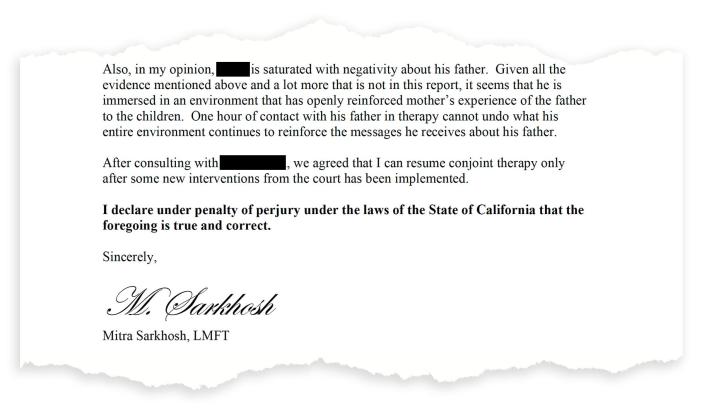
Robert was relieved to be finished with Sarkhosh, Montes said. He started seeing a new therapist, and, during the first session, he told the therapist he’d been sexually abused.
On November 18, 2020, at the direction of the San Diego County Sheriff’s Department, Robert called Winenger to try to elicit a confession. When that failed, the department paused its investigation, but the child welfare inquiry proceeded. On December 1, the California Health and Welfare Agency issued a report substantiating Robert’s claims.
“The Agency is worried that if given the opportunity, Tom Winenger will sexually abuse [Robert] again,” the report says.
Neither Winenger nor his divorce attorney, Tamatha Clemens, responded to requests for interviews or to a list of detailed questions. In a motion for custody he filed on December 8, 2020, Winenger argued that Robert’s allegations had been “orchestrated” by Montes and that her alienation “will not stop until she is restrained by the court.”
The welfare agency sent Ratekin its report on January 4, 2021, according to a cover sheet reviewed by Insider. But Ratekin was still awaiting the custody evaluation, which she’d assigned to a psychologist, Miguel Alvarez. In 2009, Alvarez coauthored a handbook for parents in custody disputes. While the manual spells out in detail how to prove an alienation claim, it offers no specific guidance on how to prove a claim of abuse.
According to the report, part of which Insider reviewed at a San Diego County courthouse, a personality test Alvarez administered suggested that Montes suffered from “extreme hyper-vigilance” and “persecutory fears.” People with these traits, Alvarez wrote, “are often quick to anger and overreact to perceived or imagined threats.”
Winenger’s scores on the same test were “normal,” Alvarez wrote, and his performance on psychosexual and polygraph tests was “inconsistent” with Robert’s allegations of sexual abuse.
The 136-page evaluation cost Robert’s parents more than $90,000, according to bills reviewed by Insider. Alvarez didn’t respond to requests for comment.
Ratekin reviewed the evaluation just before the October 28, 2021 hearing. Alvarez’s findings were “exactly” what she’d expected, she said. In her view, the situation called for immediate action.
She put Claire, 8, and Eden, 6, in their father’s custody that day, and she sent Robert, 13, to stay with his football coach. That was for Winenger’s protection, she said. Until Robert was “detoxified,” she said, he’d be prone to false claims of abuse.
Ratekin suggested Family Bridges as a solution. She’d had “really good success” with the program in another case, she said, and she thought it would ease Robert’s transition. Without it, the boy wouldn’t “get better,” she said, and his sisters stood to benefit, too.
Winenger agreed. Under an order Ratekin signed on January 3, 2022, the children would attend a Family Bridges workshop with their father from January 11 to 14 and then return to his home. Montes was barred from contact with the children for at least 90 more days. Ratekin also prohibited the children from communicating with their older sister, their maternal grandmother, and anyone else who might “interfere” with their healing.
Contact would resume at Ratekin’s discretion, depending upon how well everyone was cooperating.
Insider and Type reviewed 35 cases from the past two decades in which judges removed children from their preferred parent and sent them to a reunification program. In most of these cases, the children had resisted court-ordered visits with their fathers, and judges had held mothers responsible. Many of the judges framed the no-contact period as salutary: Children would be freed from the overbearing influence of their mothers, and their mothers would be motivated to change.
A case from New Castle County, Delaware is typical.
In 2016, Judge Janell Ostroski transferred two brothers to their father’s custody and ordered them into treatment at Turning Points for Families, a program in upstate New York run by a social worker, Linda Gottlieb. Both boys had told Ostroski that their father, Michael D., yelled at them frequently, court records show, though neither had alleged physical abuse. The 9-year-old, O., told Ostroski he felt unsafe at his dad’s house. Ashton, 14, was refusing to go there. Insider is not using the family’s full last name in order to protect O.’s identity.
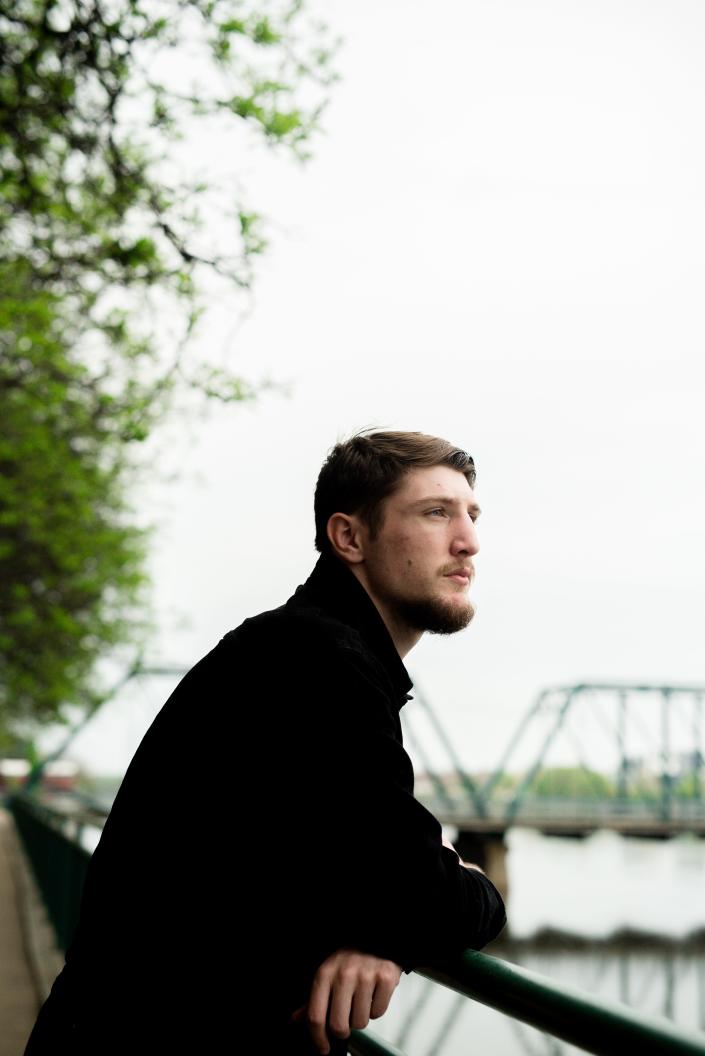
Michael had pleaded guilty several years earlier to public intoxication and indecent exposure for an incident in a public park with Ashton. A court-ordered psychological evaluation found that he had alcohol dependence and narcissistic personality disorder “with antisocial features.” In 2013, the state’s child welfare agency found that he’d emotionally abused Ashton, then 10 years old. The report, including any denials Michael presented, is sealed. This history was all cited in court three years later, in a custody dispute between Michael and his ex-wife, Kelly D.
During that dispute, Michael accused Kelly of alienation, and a custody evaluator backed him up. The evaluator, a psychologist, determined that Michael had become “a more positively functional person” and that Kelly, a preschool teacher, was the problematic parent. Kelly “distorts the reality of events” and “conveys to others an inaccurate and menacing perception of Mr. [D.],” the psychologist wrote in a May 2016 report. (Michael did not respond to detailed requests for comment. Neither did the psychologist.)
In written rulings that barred Kelly from contact with both children, Ostroski said the boys were “well cared for” in Kelly’s home but blamed her for Ashton’s refusal to see Michael. “Mother has done nothing in the past year to promote the Father/son relationship,” Ostroski wrote, adding, “the court is hopeful that, with the appropriate interventions, Mother can recognize her role in helping the children have a healthy relationship with their Father.”
Insider and Type sent questions about parental alienation and its remedies to Ostroski, Ratekin, and 19 other judges who’ve ordered the programs. Only Ratekin responded, and she declined to speak about the Winenger case because it is still pending. Nor would she answer general questions. “I am definitely not an expert in this area,” she wrote, “nor do I feel qualified to answer questions about the issue or programs.”
‘A moratorium on the past’
In her January 2022 ruling, Ratekin authorized Winenger to hire a transport company to drive Robert and his sisters to the Family Bridges workshop, which would take place at a hotel a few hours outside San Diego. There, the children and Winenger met Randy Rand, who founded Family Bridges in the early 2000s, and a woman the children knew only as “Chris.”
In 2009, Rand deactivated his psychology license after the California Board of Psychology found he’d committed professional violations including “dishonesty,” “repeated negligent acts,” and “gross negligence.” Since then, he’s accompanied at workshops by at least one other clinician.
Rand isn’t the only alienation expert to face sanctions from a state licensing board. Two other psychologists who’ve led Family Bridges workshops, Jane Shatz of California and Joann Murphey of Texas, have been sanctioned — Shatz after an allegation of negligence and Murphey after a finding that she failed to respond promptly to a subpoena. Both Alvarez, the custody evaluator in Robert’s case, and Steinberg, who runs the program where a judge sent the girl in the viral TikTok, have been cited by California regulators for improper recordkeeping. Steinberg said her citation was the result of a series of meritless complaints by an “alienating parent.”
Family Bridges workshops are held at hotels around the country and tend to cost parents more than $25,000, receipts show. In 2016, for example, one family from Seattle paid more than $27,000 to Family Bridges and another $3,500 to spend three nights at a Sheraton in Southern California. Since the children had opposed the intervention, a company was hired to transport them for an additional $8,300.
Once they arrive at Family Bridges, children quickly learn the rules, program documents show, including a policy called “a moratorium on the past.” As Murphey, the Texas psychologist, testified in 2018, “There’s no talking about ‘You did this back when.'” Instead, she explained, “this is a new family, this is a new paradigm, we are starting off in a healthy way.”

Ally Toyos was a 16-year-old in Kansas when she was taken from her mother five years ago. In an interview, she said she and her then 14-year-old sister tried defying the Family Bridges moratorium, telling Rand and his colleagues that their dad had abused them. (Toyos’ mother said a court order prevented her from speaking with the press; Toyos’ father didn’t reply to interview requests.) Threats ensued, Toyos said. The girls were told that if they didn’t comply, they could be separated, sent to wilderness camps, committed to psychiatric facilities, and cut off from their mom for the rest of their childhoods, according to Toyos.
Much of the Family Bridges workshop involves watching and discussing videos, program documents show. One of them, “Welcome Back, Pluto,” tells the fictional story of a petulant teen who scorns her father. “If you’re alienated, like Emily, you might get mad when others don’t take your complaints seriously,” a female narrator says. In time, however, Emily “learned to see things more clearly.” She realized her complaints were “exaggerated,” the narrator explains, and “sounded just like her mother’s.”
According to the video, which was scripted by Richard Warshak, a psychologist who helped develop Family Bridges, some children who steadfastly reject a parent “suffer for the rest of their lives.”
Other materials warn children against trusting their memories. Toyos, whose workshop took place at the C’mon Inn in Bozeman, Montana, said she was shown a 2013 TED Talk by Elizabeth Loftus, a psychologist who developed the idea that memory is malleable and who has served as a defense witness in high-profile trials, including Harvey Weinstein’s. Memories are often contaminated by outside influences, Loftus warns in the talk, which leads to false accusations that can ruin lives.
Insider and Type spoke with or reviewed statements by 17 youths ordered into Family Bridges, Turning Points, or other reunification programs. Their accounts of the workshops were broadly similar. Hannah Rodriguez, then a 16-year-old living in Tampa, Florida, said her workshop, in 2016, was held at Linda Gottlieb’s home in New York’s Hudson Valley. Gottlieb, the author of a book on parental alienation syndrome, had founded Turning Points about two years earlier. Rodriguez said Gottlieb’s office was right off the living room, where her husband spent his time in a recliner. Every day, Rodriguez could see him and hear his TV shows, she said.
Rodriguez, Toyos, and several other former participants said the workshops plunged them into depression.
In spring 2022, one 13-year-old girl got so distressed during a session with Gottlieb at a hotel that she banged on a wall and screamed for help, court papers show. Someone called the police, who brought her to a hospital for a psychiatric evaluation. “I just want my mom,” the girl said, according to hospital records, but under the court order she couldn’t call her. She was held at the hospital for three days.
In a written statement that Montes said he later dictated to her, Robert said he became suicidal. “The only thing that stopped me from throwing myself off the balcony was the 24/7 surveillance,” the statement reads. “I never thought so many people would be that horrible, controlling, and manipulative towards little kids.”
At the end of the workshop, Robert went home with Winenger and had “horrible, weird depressive anxiety episodes,” according to the statement. In early February, he was admitted to the psychiatric ward of a children’s hospital, according to court records.
Repeated emails to Rand were met with an auto-response saying he was “on sabbatical.” The psychologist managing Family Bridges in his absence, Yvonne Parnell, declined interview requests, as did Gottlieb. Gottlieb forwarded Insider’s queries to a lawyer, Brian Ludmer, but Ludmer said he couldn’t speak for her. Neither Parnell nor Gottlieb replied to detailed written questions.
Lynn Steinberg said her program One Family at a Time, based in Los Angeles, has treated some 50 families over the past eight years. A family therapist, she’s the author of “You’re Not Crazy: Overcoming Parent/Child Alienation.” She was the only program director who agreed to talk.
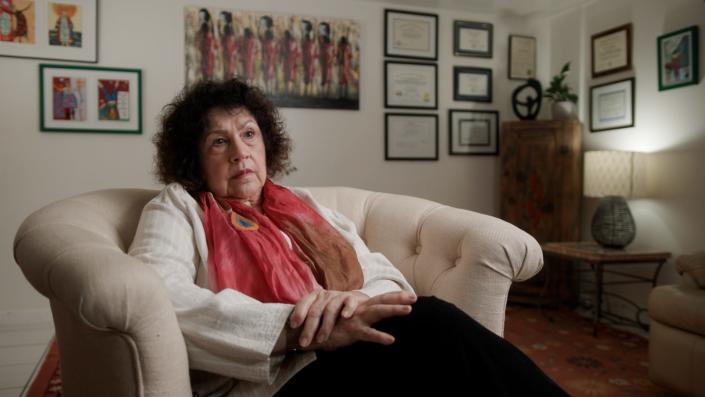
She said she begins each workshop by listening to the children and taking down every accusation they make; she then works to achieve “an agreement between parent and child.” After those conversations, she said, the children are dramatically transformed. They apologize and cry, she said; they kiss and embrace the parent they’d rejected, even sitting in the parent’s lap. They’re eager to make up for lost time, she said, and can’t wait to see long-lost kin.
Daniel Barrozo, of Chino, California, said Steinberg’s workshop was a “tremendous help” to him and his daughter in 2021. Steinberg successfully challenged his daughter’s misperceptions about him, he said. When Steinberg asked her what he’d done wrong and what she hated about him, his daughter simply looked down and cried, he said. “The whole time, she had nothing to say, because Mom was the one speaking for her,” he said. Now, he said, his relationship with his daughter is stronger than ever.
Steinberg said her own mother alienated her from her father, a realization she reached only after his death. She called her ex-husband an alienator, too, saying her adult daughters reject her to this day. She regrets that they didn’t get help from a program like hers.
Left untreated, alienated children “fail at relationships” and risk developing eating disorders, drug addiction, depression, gender dysphoria, and other ills, Steinberg said, citing her clinical experience.
But an increasing number of scholars are criticizing the programs. Jean Mercer, an emeritus professor of psychology at Stockton University, is the author of recent papers on parental alienation. One examined six reunification programs, including Family Bridges and Turning Points, and found that the research evidence supporting the effectiveness of the programs “has few strengths and many weaknesses.” For another paper, Mercer reviewed the scholarship on the programs and statements from five youths who’d attended them. She found that the programs “may contain elements of psychological abuse.”
Another study, by Michael Saini of the University of Toronto, examined 58 empirical papers on alienation and its treatments and found the body of research “methodologically weak.” While some divorcing parents exhibited “alienating behaviors” and some children rejected a parent, the nexus between those phenomena hadn’t been proved, Saini found. Moreover, he found the studies hadn’t shown that interventions worked.
Following the workshop, the programs commonly assign children to a specially trained aftercare therapist. Meanwhile, the exiled parent undergoes reeducation.
Insider obtained audio of a call last year between Gottlieb and the mother of a 14-year-old girl and a 12-year-old boy in Turning Points. “I think what you did is criminal,” says Gottlieb, who, like Steinberg, has publicly stated that her own mother alienated her from her father. There was “no reason” the children shouldn’t have a relationship with their father, Gottlieb says in the recording, and “you have failed miserably to require it.”
“That’s alienation,” she says. “That is what you are guilty of, and it’s child abuse.” For the children’s sake, the woman must “make amends,” Gottlieb says. Otherwise, “I will recommend extending the no-contact period until they’re 18.”

Insider and Type interviewed 12 mothers whose children were sent to Turning Points, many of whom said Gottlieb rebuked them over the phone and in emails. Most said they were required to write letters to the kids praising their fathers and submit them to Gottlieb for approval.
In early November 2016, Gottlieb told Kelly D. — Ashton and O.’s mother — that her letters contained superfluous details and secret messages and needed to be redone. In the end, Kelly submitted several drafts for each of her sons, all of which Gottlieb rejected.
“She sets a bar,” Kelly said. “You try to reach the bar. She sets the bar higher.”
Judge Ostroski had ordered Kelly to find a therapist “acceptable to Ms. Gottlieb” who would help her support Michael’s relationship with the children. From a list provided by the Delaware Family Court, Kelly chose a psychologist, William Northey. But Gottlieb warned in an email, “I cannot approve him before I speak with him about his specialized knowledge of alienation.”
The conversation went poorly. Gottlieb considered Northey unacceptable, she later testified, and Northey found fault with Gottlieb, too. He sent her a letter, reviewed by Insider, criticizing her for calling Kelly a “sociopath” and for using the phrase “parental alienation syndrome,” which, he wrote, “is not a recognized diagnostic term.”
Meanwhile, Gottlieb was making demands of Ashton and O. Shortly after they returned from New York, according to an email to both parents obtained by Insider, Gottlieb determined that they needed to transfer schools immediately, as their current schools had “actively undermined” their relationship with their dad.

Citing the email and a subsequent report, Michael pressed Ostroski to order the transfer. Two days later, she did, court records show.
When Insider reached out to Ostroski, the Delaware Family Court’s director of legal affairs, Addie Asay, responded by email, saying that “neither Family Court nor its judges comment on cases.”
Ashton hated his new school, he said in an interview, and at home he was perpetually afraid. “My dad was screaming and yelling, and I was getting in trouble for everything,” he said. In court testimony, Michael has denied mistreating Ashton and has said he’s been on “a journey of faith” that has changed his relationship with his children.
The boys’ aftercare therapist was working closely with Gottlieb, according to court papers. The therapist, a psychologist named Rachel Brandenburg, often discussed alienation in sessions, highlighting what she described as Kelly’s shortcomings, treatment notes show. But since Ashton disagreed with Brandenburg’s criticism of his mother, the treatment only upset him, he said. Brandenburg didn’t reply to requests for comment.
At a hearing in March 2017, Gottlieb testified that the children were “absolutely reconnected” with their father and his new wife but that Kelly, who “did not cooperate from the very beginning,” was still a danger to them.
“I’ve seen children relapse after three months of successful, wonderful reunification — relapse completely — in one 15-minute phone call with the alienating parent,” Gottlieb said.
Ostroski effectively extended the blackout. Her ruling allowed visitation in a “therapeutic setting” that could progress to unsupervised visits, but Kelly said Brandenburg never invited her to a session with the boys.
Gottlieb, Kelly said, had been given “the authority of a god.”
In 2019, Michael’s second wife obtained a domestic-violence restraining order after telling a judge he’d threatened to set her on fire. Early the next year, Ashton, who was 17, ran away, and Ostroski allowed him to return to Kelly.

She sought custody of O., too. But in September 2020, Ostroski found that Kelly still hadn’t been properly treated for her alienating tendencies and denied her petition.
For now, even visits were too risky, Ostroski concluded.
“Ashton’s behavior of running away from Father and refusing to now see Father supports Gottlieb’s prediction that, if the children are returned to Mother before she addresses her alienating behavior, they will revert to their prior behaviors when they were refusing to see Father and all of the work that has been done over the past 4 years will be wasted,” Ostroski wrote in the ruling.
‘Junk science’
In June 2010, more than a thousand mental-health practitioners, lawyers, and judges gathered at the Sheraton in downtown Denver for the annual conference of the Association of Family and Conciliation Courts, which unites players in the child-custody field from around the world. The theme that year was “Traversing the Trail of Alienation,” and over four days the condition was discussed in more than 30 sessions. Participants could learn how to spot an alienating parent, when it was best to defy a child’s wishes, and what might help an alienated child heal.
The event signified a remarkable embrace of an idea whose author had been consumed by scandal and tragedy just a short time earlier.
In the late 1990s, critics of Gardner’s dealt a powerful blow to his credibility by unearthing writings in which he’d defended pedophilia.
“Sexual activities between an adult and a child are an ancient tradition,” he wrote in a 1992 book.
As a product of Western culture, he viewed pedophilia as reprehensible, he wrote, but it may not be “psychologically detrimental” in other cultures. The following year, in a journal article, Gardner argued that from an evolutionary standpoint, children benefited from being “drawn into sexual encounters,” since these experiences steered them toward early reproduction. “The Draconian punishments meted out to pedophilics go far beyond what I consider to be the gravity of the crime,” he wrote in 1991 in “Sex Abuse Hysteria: Salem Witch Trials Revisited.”
In May 2003, at age 72, Gardner dosed himself with painkillers and stabbed himself to death. His son told reporters he was driven to suicide by chronic pain that had recently worsened.
In the assessments of his life that followed, Gardner’s work was lambasted by prominent psychiatrists, including Dr. Paul Fink, a past president of the American Psychiatric Association. “This is junk science,” Fink told Newsday in July 2003. “He invented a concept and talked about it as if it were proven science. It’s not.”
The theory could have died with Gardner. Instead, it gained ground.
In 2001, Richard Warshak, a clinical professor of psychology at the University of Texas Southwestern Medical Center, published “Divorce Poison: Protecting the Parent/Child Bond From a Vindictive Ex.” The book, released by HarperCollins, brought parental alienation theory to a wider audience — and made it more palatable. Unlike Gardner, Warshak spoke of alienation in gender-neutral terms, saying many fathers were programmers, too, and he likened the no-contact period between children and their preferred parent to study abroad.
Warshak started leading workshops for Family Bridges around 2005 and eventually became its unofficial spokesman, a role in which he excelled. In 2010, he appeared in “Welcome Back, Pluto” and published an influential article about Family Bridges in the AFCC journal.
In that study, Warshak reported on outcomes for the 23 children he’d worked with in the program so far. During the four-day workshop, 22 of them recovered a “positive relationship” with their rejected parent, he observed, including recalcitrant teens.
After the workshop, however, four children regressed, Warshak wrote, following what he called “premature” contact with their preferred parent. The program worked best, he said, when this contact was blocked “for an extended period of time.” Warshak didn’t respond to interview requests.
Meanwhile, another Gardner successor, Dr. William Bernet, a professor of psychiatry at Vanderbilt University, was working to push alienation theory forward. He submitted a proposal to the American Psychiatric Association to include “parental alienation disorder” in the next version of its Diagnostic and Statistical Manual of Mental Disorders, or DSM, and authored a scholarly article making the case for inclusion. He submitted a similar application to the World Health Organization, which was revising its International Classification of Diseases.
Bernet declined a request for an interview. But in a 2010 book, he wrote that since alienation scholarship had advanced in the wake of Gardner’s death, “there is no need now to dwell on the details of what Richard Gardner did or said or wrote.”
At the AFCC’s conference in Denver in June 2010, Warshak was given a platform to discuss his Family Bridges paper, as was Bernet, to describe his DSM bid. Other presenters staked out a more moderate stance, arguing that while alienation was a pervasive problem, there was insufficient research to support construing it as a mental illness or ordering extreme interventions.
A few alienation opponents presented, including Joan Meier. But she said she flew home to Washington in tears.
“Everywhere I turned, alienation was the coin of the realm,” she said.

She set out to design a study that would document how women who alleged abuse were treated in family courts nationwide — especially when alienation was raised. The Justice Department supported the project with a grant of $500,000.
In 2013, the new edition of the DSM was released with no mention of parental alienation. And in 2020, the World Health Organization ruled that parental alienation was “not a health care term” and lacked “evidence-based” treatments.
Bernet and his colleagues simply regrouped. In court, they started calling alienation a “dynamic” or a “phenomenon” rather than an illness, which appeared to satisfy some judges. And Bernet incorporated the nonprofit Parental Alienation Study Group, a coalition of parents, lawyers, and therapists who collaborated on cases and research. Rand, Gottlieb, and Steinberg joined, along with hundreds of other mental-health practitioners involved in custody work. Many, like Steinberg and Gottlieb, claimed to have experienced alienation themselves.
Meier assembled her own research team, comprising a statistician, three social scientists, and two assistants, to conduct her large-scale study. In January 2020, just weeks before the WHO decision, the results were published in the Journal of Social Welfare and Family Law.
The stark findings shocked even her.
Most trial-court rulings in custody cases are unpublished, but Meier’s team identified 15,000 rulings involving abuse or alienation that were published electronically from 2005 to 2014. After winnowing that dataset to cases in which the only parties were two warring parents — not, for example, a child welfare agency — the team was left with 4,300 rulings. There were nearly 2,200 cases in which a mother had accused her ex of spousal or child abuse, and in 10% of these, the father had fought back with an alienation claim.
In general, judges were hesitant to credit mothers’ abuse claims. When alienation wasn’t raised, judges credited these claims 41% of the time, Meier found, and 26% of the time, mothers lost primary custody.
For the 222 mothers whose spouses accused them of alienation, the picture was even grimmer. Women who alleged abuse and whose husbands accused them of alienation lost custody half the time — twice as often as women who weren’t accused of alienation.
To Meier, one of the study’s most staggering findings was how rarely mothers branded with the scarlet “A” were believed. In cases where mothers alleged child physical abuse and fathers cross-claimed alienation, judges credited mothers a mere 18% of the time, she found. And in the 51 cases where mothers alleged child sexual abuse and fathers claimed alienation, all but one mother was disbelieved.
For a father accused of child molestation, Meier concluded, “alienation is a complete trump card.”
‘The whole world is watching’
In January 2022, three months after losing her children, Montes chanced upon a sickening discovery.
In a cloud storage account she’d once shared with Winenger, she said, she found thousands of his photos and videos, including explicit images of their three shared children. She loaded them onto a thumb drive for the San Diego County Sheriff’s Department, whose investigation into Winenger had never closed.
Within days, Winenger was arrested. He was soon charged with 19 felonies, including possession of child pornography and 14 counts of committing forcible lewd acts against a child, Robert.
He pleaded not guilty and was released on bail, his access to the children suspended. Because of the no-contact order he’d previously obtained against Montes, the children landed in a county shelter. Winenger’s defense attorney, Patrick Clancy, declined to comment on Winenger’s behalf, saying he doesn’t try his cases in the press.
Suddenly, the custody dispute was transferred to juvenile dependency court, which meant Ratekin was no longer presiding. The new judge ordered the kids into their mother’s care while the case was pending. On February 18, they came home.
At first, Montes said, the two youngest children were so scared of being taken again that they couldn’t sleep in their rooms. She set up a big mattress on her bedroom floor.
Meanwhile, Joan Meier was using her research to make inroads with policymakers.
She’d worked with colleagues to draft a federal law that would incentivize states to protect children from abusers during custody disputes. They named the bill Kayden’s Law, after a girl in Pennsylvania whose father murdered her during a court-ordered visit. During negotiations over reauthorization of the Violence Against Women Act, the child’s congressional representative, Brian Fitzpatrick, got Kayden’s Law in.
The legislation, signed into law on March 15, 2022, sets aside up to $5 million a year for grants to states if, among other measures, they mandate training for custody judges on abuse and trauma and prohibit them from ordering treatments that cut children off from a parent to whom they are attached. If enough states comply, the law could spell the end of the reunification programs.
Last summer, California was the first state to consider such a bill. It was introduced by state Sen. Susan Rubio of Los Angeles County, a survivor of domestic violence herself, after she heard from mothers who’d been accused of alienation and children who’d been sent to reunification programs.
Rubio’s bill set off a battle that has since spread to statehouses around the country. Steinberg, the alienation therapist from Los Angeles, was a vocal opponent, arguing that men would be rendered powerless against false accusations. She was joined by fathers’ rights groups and by the Parental Alienation Study Group, which was simultaneously pushing hard to discredit Meier’s study. (Two prominent members of the group authored a study concluding that her findings could not be replicated, which Meier then rebutted.) After Rubio’s bill passed the assembly unanimously last August, she was forced to withdraw it in the face of intense opposition from state judges over the training mandate.
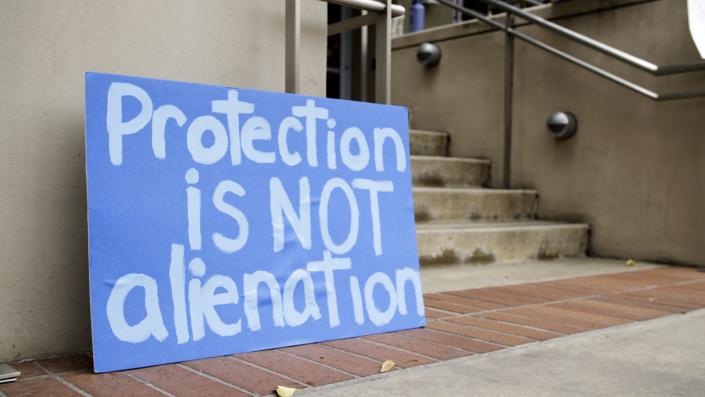
Then, last October, the momentum shifted. That’s when Maya, the 15-year-old from Santa Cruz, told a custody judge that her mother had abused her and her brother. The judge, Rebecca Connolly, didn’t believe her and ordered the children into Steinberg’s program, cutting off contact with their father. The graphic video of the children being seized on October 20 was quickly viewed millions of times.
In response to an interview request, an officer of the Santa Cruz County Superior Court said Connolly could not speak about pending cases. Maya’s mother has denied the abuse claims in court. Her lawyer, Heidi Simonson, declined an interview, citing court orders pertaining to “privacy and confidentiality.”
On the heels of the viral video, a coalition of activists — many of them mothers accused of alienation — organized protests around the country. The first took place October 28 outside the courthouse where Maya had just testified. Standing on concrete risers and facing the building, a pack of Maya’s friends demanded her return. “The whole world is watching!” they shouted. Protests also erupted in Michigan, Kansas, and Utah.
Rubio introduced a new bill, with modified judicial training requirements, in February. A similar bill passed both chambers of the Colorado legislature in April. One in Montana died in committee; its sponsor, Sen. Theresa Manzella, said she was up against a “deliberate distribution of misinformation” by opponents, including attorneys who use parental alienation as a legal tactic.
Montes said she’s “cautiously optimistic” about Winenger’s criminal trial, set to begin in June, and she hopes for an imminent victory in her custody case. Five years of legal bills have left her in debt and on food stamps, she said, but she considers herself lucky all the same. Almost every day, she talks to mothers who remain severed from their children.
Mothers like Kelly D., whose children were sent to Linda Gottlieb’s reunification program in New York.
Kelly last saw her younger son, O., early on a Monday morning. It was a warm, sunny day, and she dropped him off at his best friend’s house so they could shoot baskets before school. She hugged him, told him she loved him, and said she’d pick him up in the afternoon. Then she drove to court for a hearing.
That was six years, six months, and 24 days ago.
The reporting for this story is part of a forthcoming documentary from Insider, Retro Report, and Type Investigations.
If you are experiencing domestic abuse, you can call the National Domestic Violence hotline at 1-800-799-7233.
Read the original article on Insider
[ad_2]
Source link


